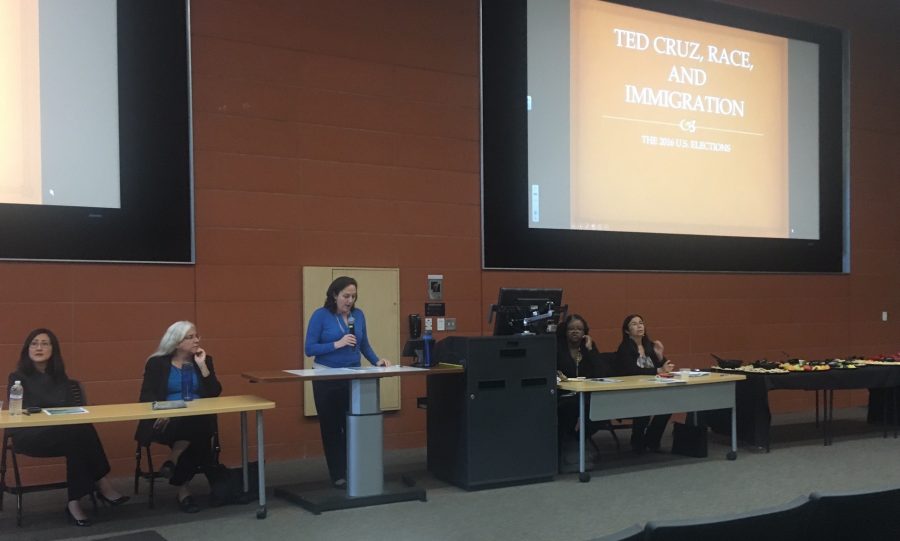Issues revolving around the 2016 presidential election, including immigration, women’s rights and the importance of political involvement, were discussed in a panel presented by the San Diego State Women and Politics Working Group on April 6 in the Storm Hall West building.
The panel was moderated by Department of Political Science Chair Ronnee Schreiber. It involved SDSU professors Victoria Gonzalez Rivera, Doreen Mattingly and Kimala Price, and former City Council candidate Carol Kim.
The discussion was the second gender justice event at SDSU this year.
“I wish we wouldn’t have to do these in some ways,” Schreiber said.
Rivera is a professor in the Department of Chicana and Chicano Studies and she focused on immigration and the dilemma of whether Senator Ted Cruz is really a Latino.
Cruz identifies himself as one because his father was born in Cuba and later immigrated to the U.S.
However, Rivera explained how most Latinos in the U.S. don’t support his stance on issues, especially immigration.
“We don’t get to decide what someone’s ethnic background is,” Rivera said. “But the real question people want to ask is, ‘OK, he’s Latino, but why doesn’t he represent the experiences or interests of most Latinos in the U.S?’”
Rivera said of the 55 million Latinos living in the U.S., 27.3 million are eligible to vote and most will not be in favor of Cruz.
“When it comes to it, is Cruz Latino? Yes, sure, why not? But that is almost irrelevant,” she said. “He, like Donald Trump, represents the view that all 11 million immigrants should be deported. And this is, in my point of view, unacceptable.”
Mattingly then shifted to Secretary Hillary Clinton’s difficulty in running a successful campaign because of her gender.
She listed some stereotypes among voters concerning women candidates, such as women being more liberal and moral, being outsiders and being weaker on foreign policy.
She also said Clinton is seen as not feminine or masculine enough, but she also can not act immature the way Trump and Cruz do when debating.
“Clinton can not embody that part of masculinity,” Mattingly said. “For any woman running, this is a very difficult position because you will never be more masculine.”
Mattingly mentioned that in Clinton’s first election, she was told she shouldn’t campaign on women’s issues because she would lose popularity among male voters.
The discussion then shifted to the topic of reproductive justice, in which Price focused on abortion rights.
She started off by mentioning a recent interview in which Trump said women who have abortions should be punished.
“This stirred up supporters of reproductive justice,” Price said.
Price spent most of her presentation listing restrictions on abortion, and finished off by encouraging the audience present to vote.
“The more Republicans we have in office, the more restrictions we have on abortions,” she said. “It’s important to elect people in Congress that will make sure we have access to things like Planned Parenthood.”
While most of the speakers spent time discussing matters on the national level, Kim focused on the local level.
Kim said she was raised in a Republican home and attended UCLA. When she graduated, she went on to teach in an elementary school in a low-income community between USC and Staples Center.
“It was a very challenged community. It wasn’t until I started working with those students and their parents in that neighborhood that I saw systemically, there are barriers to people succeeding,” Kim said. “I realized how politicized education is. It opened my eyes.”
Kim then volunteered for Barack Obama’s campaign, became staging location director for his grassroot campaign and ran for San Diego’s City Council in 2014 but came in second.
She said the purpose of telling her story was to motivate people to get politically involved.
“I learned that ordinary people are capable of doing extraordinary things when they come together, and that is real,” Kim said.









